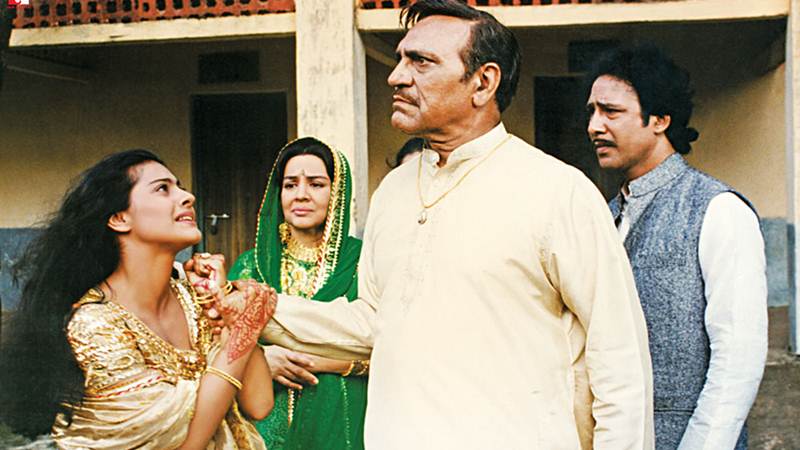More than “Raj, नाम तो सुना ही होगा”, more than “señorita”, even more than “आओ, आओ”, the dialogue that defines Dilwale Dulhania Le Jayenge (DDLJ) is “जा, सिमरन जा, जी ले अपनी ज़िंदगी”.
DDLJ. The eternal Bollywood blockbuster, second only to Sholay, if at all. A film way ahead of its times…. or was it?
DDLJ did start a decade long domination of romantic comedies, of Punjabi wedding songs, of family gatherings and of course of a Shahrukh Khan with his hands outstretched. It also kickstarted the NRI market as a major territory. It was a behemoth in business sense. A redefinition of Hindi commercial cinema. But what did it achieve cinematically, culturally?
Well, it reinforced a lot of stereotypes. Shahrukh and his friends are exactly the type of people mother warns you about. Party goers, beer drinking flirts who have had a bunch of girlfriends, and are serious about none. Any party girl is sure to fall prey to them.
The the heroine, thank God, is not one of “those” girls. She’s immune to his charms and traditional. Because she comes from a family that values tradition. Tradition, you see, is another name for oppression. An overbearing father longing for a long lost homeland that he left for greener pastures is trying to impose his longing on his London bred daughters.
Forced to live without any power over their own destinies, the girls seek pleasure in small rebellions of dancing to western music and dreaming of a Prince Charming. Even going on a trip with female friends requires a near meltdown. And then he pronounces “जा, जी ले अपनी ज़िंदगी”. All magnanimous in granting an adult a vacation before she is forced to marry some stranger.
That he chooses “आदर्श नारी” over all the modern girls he’s met is no surprise. Indian heroes have always done that, laying down the rules for indian girls: be docile or be used and discarded. Well, he’s now decided he wants her, and comes to her, and they elope. No wait.
यहीं तो फ़िल्म offbeat हो जाती है। He decides to wait for paternal approval. Mother’s approval is not enough, because what do mothers know anyway. The father ultimately owns the body, and it’s his seal of approval that matters. Behind all the sweetness of family wedding is a strong patriarchal assumption that seemed wrong to me even in the 90’s, and seems almost cruel now.
The father who sells beer but moralizes on those who drink it, who doesn’t care what sort of home his daughter is going to, and who has taken all efforts to suppress his wife and daughters, and squeeze all personality out of them. That father is a sympathetic figure, quietly feeding his pigeons and clinging to the social mores of Victorian era. That’s the guy who needs to approve.
In Cocktail, Saif chooses demure Diana over Deepika who has personality. In Rockstar, the couple agonize over her marital status as if set in stone. In 2 States, the lead couple don’t marry till the parents approve. Long forgotten is the brave and brazen rebellion of “Ek Duje Ke Liye”. In countless movies since, countless incidents of injustice have seemed normal. Because DDLJ was such a successful film. Not just commercially, it was a great entertainer. It was charming, fresh and it wrapped its stale message in many layers of fresh looking wrappers. Not that DDLJ was more regressive than usual, it just made regressive “cool”.
No matter how charming though, the movie was dragging us backwards into elder worship, even when they are wrong.. No one in the world has the right to take away your right to your own life, and then give it back as a favor.
